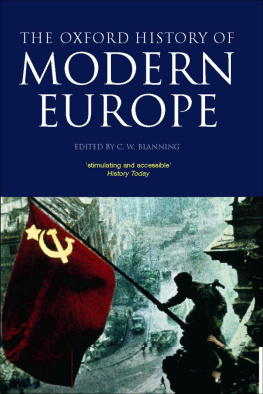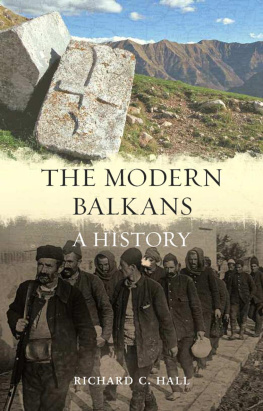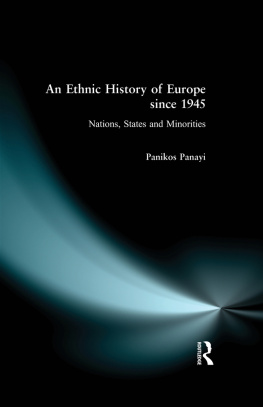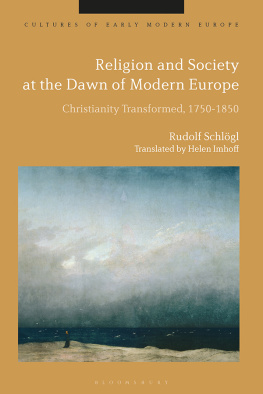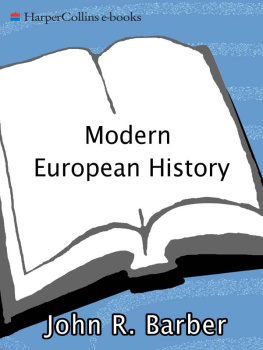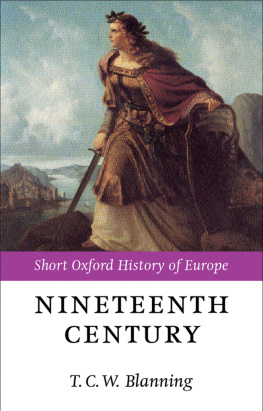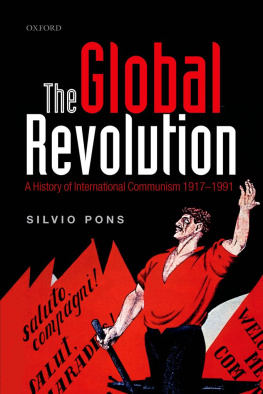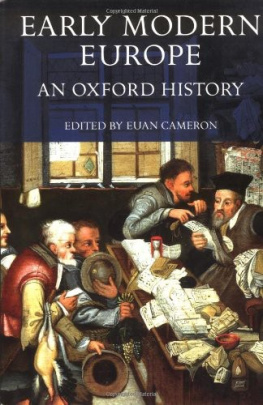THE OXFORD HISTORY OF MODERN EUROPE
THE EDITOR
T. C. W. B LANNING is Professor of Modern European History at the University of Cambridge.
THE OXFORD HISTORY OF MODERN EUROPE
EDITED BY
T. C. W. BLANNING


Great Clarendon Street, Oxford ox2 6DP
Oxford University Press is a department of the University of Oxford. It furthers the Universitys objective of excellence in research, scholarship, and education by publishing worldwide in
Oxford New York
Athens Auckland Bangkok Bogot Buenos Aires Calcutta Cape Town Chennai Dar es Salaam Delhi Florence Hong Kong Istanbul Karachi Kuala Lumpur Madrid Melbourne Mexico City Mumbai Nairobi Paris So Paulo Singapore Taipei Tokyo Toronto Warsaw
with associated companies in Berlin Ibadan
Oxford is a registered trade mark of Oxford University Press in the UK and in certain other countries
Published in the United States
by Oxford University Press Inc., New York
Oxford University Press 2000
The moral rights of the author have been asserted
Database right Oxford University Press (makers)
First published 1996
First issued as The Oxford History of the Modern Europe 2000
All rights reserved. No part of this publication may be reproduced, stored in a retrieval system, or transmitted, in any form or by any means, without the prior permission in writing of Oxford University Press, or as expressly permitted by law, or under terms agreed with the appropriate reprographics rights organisation. Enquiries concerning reproduction outside the scope of the above should be sent to the Rights Department, Oxford University Press, at the address above
You must not circulate this book in any other binding or cover and you must impose this same condition on any acquirer
British Library Cataloguing in Publication Data
Data available
Library of Congress Cataloging in Publication Data
Data available
ISBN 0192853716
2 4 6 8 10 9 7 5 3 1
Typeset by
Cambrian Typesetters, Frimley, Surrey
Printed in Great Britain by
Cox & Wyman Ltd
Reading, Berkshire
CONTENTS
T. C. W. BLANNING
1. Revolution from Above and Below: European Politics from the French Revolution to the First World War
JOHN ROBERTS
2. The Industrialization of Modern Europe, 17501914
CLIVE TREBILCOCK
3. Military Modernization, 17891918
HEW STRACHAN
4. From Orders to Classes: European Society in the Nineteenth Century
PAMELA PILBEAM
5. The Commercialization and Sacralization of European Culture in the Nineteenth Century
T. C. W. BLANNING
6. The Great Civil War: European Politics, 19141945
PAUL PRESTON
7. The Fall and Rise of the European Economy in the Twentieth Century
HAROLD JAMES
8. Warfare in Europe since 1918
RICHARD OVERY
9. European Society in the Twentieth Century
RICHARD BESSEL
10. From Modernism to Post-Modernism
MARTIN JAY
11. Europe Divided and Reunited, 19451995
DAVID REYNOLDS
LIST OF PLATES
LIST OF MAPS
LIST OF CONTRIBUTORS
T. C. W. Blanning is Professor of Modern European History at the University of Cambridge and a Fellow of Sidney Sussex College.
John Roberts was Warden of Merton College, Oxford, until his retirement in 1994.
Clive Trebilcock is Reader in History at the University of Cambridge and a Fellow of Pembroke College.
Hew Strachan is Professor of Modern History at the University of Glasgow.
Pamela Pilbeam is Professor of History at Royal Holloway and Bedford New College, University of London.
Paul Preston is Professor of International History at the London School of Economics and Political Science.
Harold James is Professor of History at Princeton University.
Rchard Overy is Professor of History, Kings College London.
Richard Bessel is Professor of History at the University of York.
Martin Jay is Professor of History at the University of California at Berkeley.
David Reynolds is Reader in History at the University of Cambridge and a Fellow of Christs College.
Introduction
In 1914, the French poet Charles Pguy wrote that the world had changed more since he started going to school in the 1880s than during the two previous millennia. If he had not died shortly afterwards but had lived out his full biblical allocation of three score years and ten until 1943, he would have experienced even more dramatic changes. It has been this conviction that the ground is moving beneath their feet which has characterized modern Europeans. Among other things, it has given them a strong dynamism: the world is changing, it can be changed, and so it should be changed. On the eve of the French Revolution, the German playwright Gotthold Ephraim Lessing identified the essence of modern man as follows: he often achieves very accurate insights into the future, but he cannot wait for the future to come. He wants to see the future accelerated, and also wants to do the accelerating himself. For what is there in it for him, if what he sees to be desirable is not brought about in his lifetime?
It is with no sense of triumph, rather the reverse, that one records that modern Europeans have transformed not only their own continent but also the world. What they could not conquer directly, they ensnared in economic, social, and cultural bonds. What is sometimes described as the Americanization of the world has been conducted by the descendants of Europeans who conquered North America and eliminated most of its aboriginal population. The European origin of the culture which was then re-exported with such dazzling success in the twentieth century is revealed not least by the name of its most ubiquitous symbolthe hamburger.
Many explanations for Europes hegemony have been offered. Was it Europes special geography, with its deeply indented coastline, profusion of rivers, absence of flood-plains, and its relatively simple flora and fauna deriving from its peculiar mountain pattern? Was it the bracing competition engendered by the plurality of states and churches, saving Europe from stable but stagnant uniformity? Was it Europes early embrace of secularization and with it the disenchantment of the world, meansends rationality, and the scientific revolution? Was it Europes adoption of the division of labour, leading to commercialization, urbanization, and industrialization? Was it the development of new social forms, in which the organic community based on kinship, neighbourhood, or religious belief (Gemeinschaft) made way for a society of atomized individuals driven by self-interest and the cash nexus (Gesellschaft)? Was it Europes discovery of the power of the nation-state, combining a sense of national identity with bureaucratic administration and democratic institutions? As we shall discover from this volume, all of these hypothesesand the many others which have been offeredare more or less persuasive, but none of them is sufficient.
Something which changes is naturally more interesting than something which stays the same. That this banal observation is a truism should not blind us to its importance. A history which presents only changes is a history which tells only half the story: for every value or institution which is modified or disappears altogether, there is another which remains the same. Moreover, not all changes prove to be irreversible. Only predictions as general as Europe will never return to a mainly agrarian economy can be made with any confidence. Such is the cunning of history (Hegel) that the neater the scheme for understanding the past, explaining the present, and predicting the future, the quicker it is undone. How many divisions has
Next page
